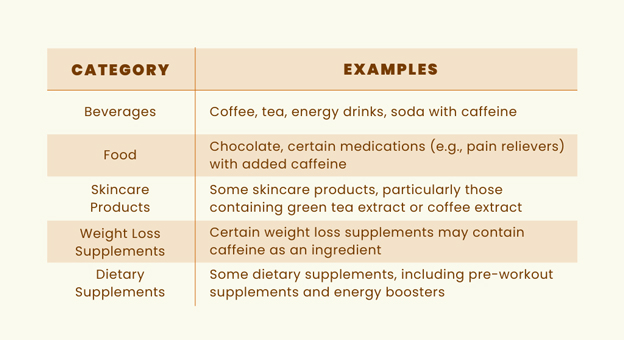Caffeine, a ubiquitous stimulant found in coffee, tea, energy drinks, and various other beverages and foods, is a cornerstone of modern society’s daily routines. Its consumption is ingrained in cultures worldwide, fueling productivity and providing a morning boost for millions. However, amidst its pervasive presence, a lesser-known aspect lurks in the shadows: caffeine allergy.
While relatively rare, caffeine allergy can elicit a spectrum of adverse reactions, ranging from mild discomfort to severe symptoms. Understanding this phenomenon is crucial for individuals who may experience unexpected health effects after consuming caffeine-containing products.
This article explores what caffeine allergy is, its symptoms, and management.
What is Caffeine Allergy?
Caffeine allergy is characterized by an adverse immune response to the consumption of caffeine. While caffeine sensitivity is more common and may result in mild symptoms like jitteriness or increased heart rate, caffeine allergy involves the body’s immune system mistakenly identifying caffeine as a harmful substance. Though rare, caffeine allergy can manifest in a variety of symptoms, which can range from mild to severe.
What are the Symptoms of a Caffeine Allergy?
Symptoms of caffeine allergy can vary widely in their presentation and severity. Here are some common symptoms to be aware of:
Physical Symptoms:
- Headaches
- Nausea
- Vomiting
- Heart Palpitations
- Increased Heart Rate
- Difficulty Breathing
Psychological Symptoms:
- Anxiety
- Irritability
- Nervousness
- Restlessness
- Insomnia
It’s important to note that symptoms can vary from person to person, and some individuals may experience a combination of these symptoms or only a subset of them. Additionally, the severity of symptoms can range from mild discomfort to potentially life-threatening reactions like anaphylaxis.
Caffeine Sensitivity vs. Caffeine Allergy
Defining caffeine sensitivity and caffeine allergy can be challenging due to their overlapping symptoms and mechanisms. The challenge lies in distinguishing between the two, as their symptoms can overlap, and individual responses to caffeine can vary widely. Additionally, there is no standardized diagnostic test specifically for caffeine allergy, further complicating the differentiation process.
Caffeine sensitivity typically involves an enhanced response to caffeine’s effects, such as jitteriness, increased heart rate, or difficulty sleeping. On the other hand, caffeine allergy is characterized by an adverse immune response to caffeine, leading to symptoms like headaches, nausea, palpitations, or difficulty breathing.
This comparison table outlines the key differences between caffeine sensitivity and caffeine allergy:
| Aspect | Caffeine Sensitivity | Caffeine Allergy |
| Definition | Heightened response to caffeine | Adverse immune reaction to caffeine |
| Mechanism | Enhanced sensitivity or tolerance | Immune system identifies caffeine as harmful |
| Symptoms | Mild, including jitteriness, increased heart rate, and insomnia | Can range from mild to severe, including headaches, nausea, palpitations, difficulty breathing |
| Onset | Immediate or delayed | Immediate, but can vary |
| Prevalence | Common | Rare |
| Diagnosis | Based on symptom pattern and caffeine intake history | Requires medical evaluation, potentially including allergy testing |
| Treatment | Reduce caffeine intake; manage symptoms as needed | Complete avoidance of caffeine-containing products; medical support for severe reactions |
Caffeine Allergy Diagnosis
Diagnosing caffeine allergy typically involves consultation with an allergist, who may employ various methods such as medical history assessment, physical examination, and allergy testing.
While there are no standardized blood tests specifically for caffeine allergy, allergists may conduct blood tests to detect specific antibodies associated with allergic reactions. These tests can help confirm or rule out caffeine allergy, although their accuracy may vary, and interpretation should be done in conjunction with other diagnostic factors.
Caffeine Allergy Treatment
Treatment for caffeine allergy primarily involves avoiding caffeine-containing products to prevent allergic reactions. Once diagnosed, individuals with caffeine allergy should take steps to eliminate caffeine from their diet and lifestyle. Here are some key steps:
- Avoidance: Eliminate caffeine from diet and lifestyle.
- Medical Support: Seek help for severe reactions; consider emergency medications.
- Allergy Management: Educate yourself, inform others, wear a medical alert.
- Nutritional Guidance: Consult a nutritionist for a balanced, caffeine-free diet.
- Psychological Support: Address emotional aspects; practice stress management techniques.
7 Practical Tips
By following these tips individuals with caffeine allergy can effectively manage their condition and minimize the risk of allergic reactions:
- Complete Avoidance: Stay away from all caffeine-containing products, including coffee, tea, and certain medications.
- Label Checking: Read ingredient labels carefully to spot hidden sources of caffeine in foods and beverages.
- Inform Others: Make sure friends, family, and healthcare providers are aware of your caffeine allergy to prevent accidental exposure.
- Emergency Readiness: Carry prescribed emergency medication, like antihistamines or epinephrine, in case of severe reactions.
- Explore Alternatives: Enjoy caffeine-free beverages like herbal teas or fruit-infused water for hydration and refreshment.
- Medical Alert: Consider wearing a medical alert bracelet or carrying a card indicating your allergy to alert others during emergencies.
- Dietary Guidance: Seek advice from a nutritionist for a balanced diet without caffeine, ensuring you meet nutritional needs.
Here’s a simple table outlining products to avoid for individuals with caffeine allergy:

Conclusion
In conclusion, navigating life with caffeine allergy requires diligence and awareness. By avoiding caffeine-containing products, informing others about your allergy, and being prepared for emergencies, you can minimize the risk of allergic reactions and lead a safe and fulfilling lifestyle.
Remember to consult with healthcare professionals for personalized guidance and support in managing your caffeine allergy. With careful attention and proactive measures, you can confidently navigate your caffeine-free life and prioritize your health and well-being.

